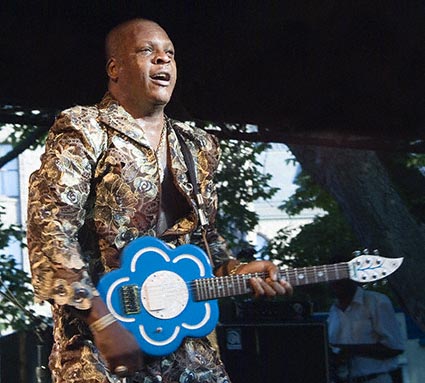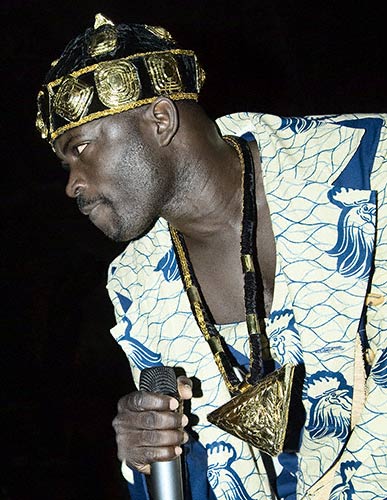| Afrofest. A celebration of African cultures. Music, stands selling merchandise (African drums, jewellery, clothing, sculpture, books and CDs), food stalls, drum circles and a children’s village with face painting, crafts like beadwork and masks, dance workshops and stilt-walkers. A temporary village in Queen’s Park. A multitude of people of all ages from a multitude of backgrounds walk about, listening to the drummers, looking at merchandise, eating or heading to the main stage.
At the main stage, the festival is officially opened with a ceremony conducted by Dr. Modesto Amegago. He is the director of the Southern Volta Association Cultural Group who are the first performers in the lineup. This group was formed by historians, teachers, musicians, dancers and other professionals. Its purpose is to teach members, particularly Ewe youth, about Ewe culture. They put on a colourful performance of dances illustrating various aspects of Ewe life from the search for new settlements to the performance of household chores and the display of physical beauty.
Next up is another dance troupe, Nouvel Exposé. They perform some of the lesser-known traditional African dances but they are also open to contemporary dance. They use their creative energy and skills to present works of Ethiopian, Eritrean, Congolese, Egyptian, West African and Hip Hop dances.
Regrettably, I miss singer, bongo player and songwriter Eid Ismail from the Sudan. But it’s hot, 31 degrees, and I’m thirsty and hungry so I head for the food. So much choice. Couscous with your choice of meat, samosas, jerk chicken, roti, curry goat, roasted yams, corn soup, roasted corn, plantain, tandoori chicken, deep fried banana beignes (fritters) hot from the pan, Ethiopian specialities and more. For heat relief, there is homemade ice cream in flavours such as coconut, mango and Guinness. And of course, there is fruit. There are so many trees in this park, I find a nice shady spot and enjoy my meal.
Back at the main stage I catch the last part of the performance of Moto, a dancer, singer, and comedian and his band Kapia du Congo. Moto wows the crowd, shinnying up one of the poles supporting the canopy of the stage and spinning a bicycle wheel on his head and in his mouth. Astounding.
|
| Juju has its roots in the Yoruba culture of Nigeria. Instrumentation consists of intricate guitar lines, bass (both electric these days), Hawaiian slide or pedal steel guitar and various percussion instruments. The music is particularly characterized by vocal harmonies and the sound of the talking drum. Probably the first performers of this style of music to become known outside of Africa were “Chief Commander” Ebenezer Obey and King Sunny Ade. Sir Shina Peters created his own unique mix of Juju music by adding in elements of Fuji and Afro-beat. His style became immensely popular, starting “Shinamania” in Nigeria and earning him Nigeria’s Juju Musician of the Year award in 1990.
The songs are sung in the Yoruba language and although the music is enjoyable anyway, I know I am missing out. Unlike most, Yoruba is a tonal language, meaning that the pitch of a syllable determines the meaning of a word so that the lyrics and the melody are inter-related in a way that is not possible in a language such as English.
King Mensah’s show closes the evening. From the moment he walks onto the stage, resplendent in blue and gold, he captivates the audience with his presence. He is known as the “Golden Voice of Togo” and he is a true master of that voice. His singing is full of subtle modulations and when he shoots up into falsetto the crowd goes wild. As for his dance, he is capable of the separate control of each muscle that comes with long training and natural talent and he is completely aware of how he looks in every pose. It’s easy to see and hear why he has been the winner of seven awards of excellence, including the all-African KORA Music Award for Best Traditional African Artist in 2000 and 2004. His show is a complete work of art.
|



